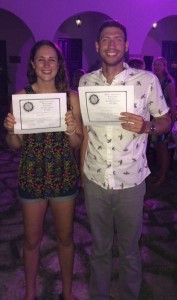NSU Newsroom
SharkBytes
Horizons
This version of NSU News has been archived as of February 28, 2019. To search through archived articles, visit nova.edu/search. To access the new version of NSU News, visit news.nova.edu.
This version of SharkBytes has been archived as of February 28, 2019. To search through archived articles, visit nova.edu/search. To access the new version of SharkBytes, visit sharkbytes.nova.edu.
Halmos Graduate Students Win at International Marine Conference
Halmos College of Natural Sciences and Oceanography Masters of Science in marine biology students Megan Bock and Morgan Hightshoe came in second and third place for best student talks at the Association of Marine Laboratories of the Caribbean (AMLC) Conference. The 38th AMLC Scientific Meeting was jointly sponsored by Universidad Autónoma de Yucatán, Universidad Nacional Autónoma de México, and CINVESTAV Unidad Mérida from May 22-26 in Mérida, Yucatán, México. In addition to Bock’s and Hightshoe’s awards, M.S. student Hannah Nylander-Asplin received an AMLC grant of $1,000 toward her research. All three students are members of the Halmos Research Laboratory run by Assistant Professor Nicole Fogarty, Ph.D.
AMLC was founded in 1957 by marine researchers with interests in the marine science of the tropical Atlantic and the Caribbean. Founded primarily as a scientific organization, the strength of AMLC lies in the diversity of its member laboratories and the extensive expertise of its membership. Its goals include advancing common interests in the marine sciences, encourage the exchange of research results, foster cooperative research projects, to expose students to established scientific methods, and to participate in decisions made by national and international organizations concerning the marine environment.
